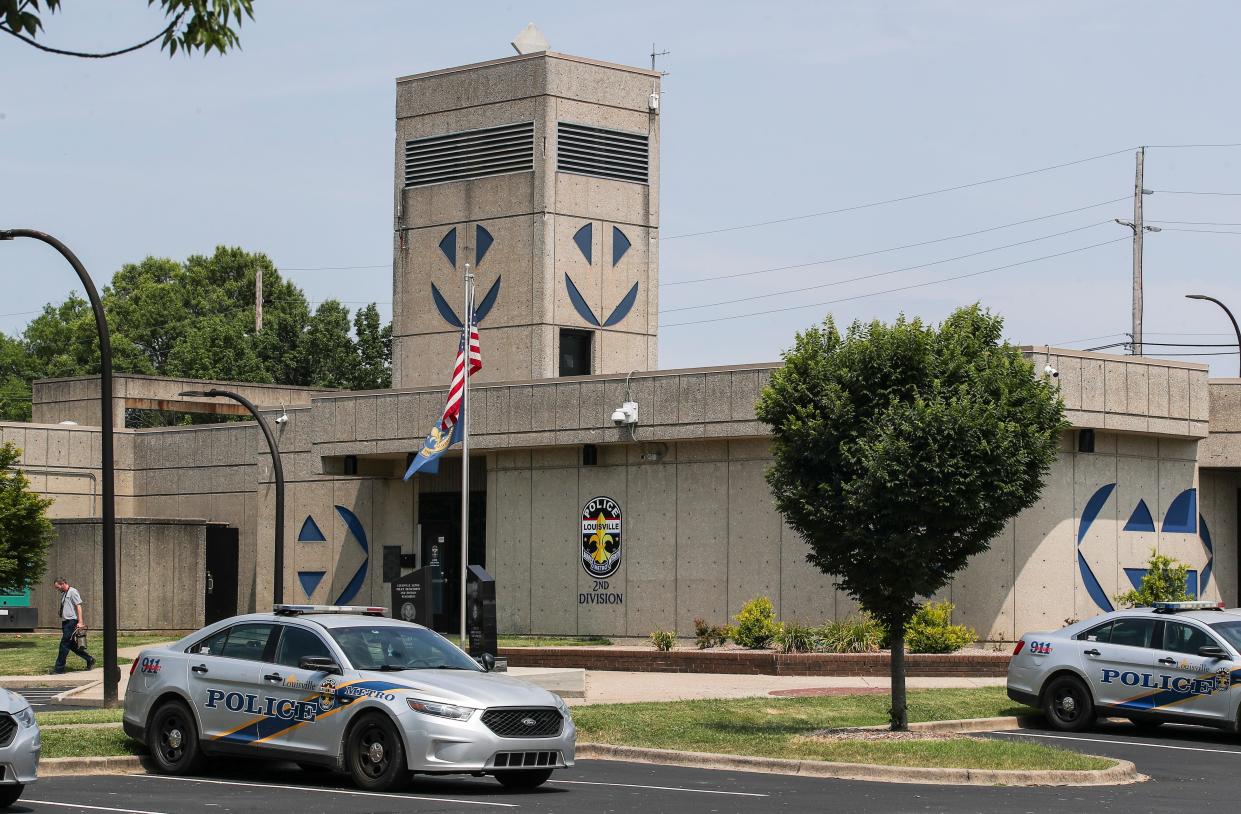How failures by Louisville police detectives led to an Inspector General investigation

Mary Spalding remembers walking into the basement of her West End home to get socks as she was getting ready to go to work on a December morning five and a half years ago.
She doesn’t remember much else ― other than being hit, repeatedly, and lying on the floor, telling herself to play dead before she blacked out.
The brutal assault left her in the hospital under a pseudonym for her protection. She was treated for acute blood loss, fractures in her hands and lacerations to her scalp.
She did not see who attacked her, but there were no signs of forced entry and only two other people had keys to her home.
The original Louisville Metro Police detective assigned the case, Deidre "Dee Dee" Mengedoht, 32, was energetic and engaged, she said, frequently checking in with Spalding and bringing her a “little bitty Christmas tree” as a birthday present a few days after the attack.
“She took the case seriously. She knew I was attacked, she knew there was a primary suspect, and was pursuing it. And then she was gone,” Spalding, now 72, said in an interview with The Courier Journal.
Mengedoht was killed a week later, on Christmas Eve, when a Metropolitan Sewer District truck smashed into her cruiser on Interstate 64. The driver was watching pornography at the time of the crash, according to court filings.
Neither of the two detectives later assigned to the case would interview the suspect. Neither would show Spalding surveillance footage she says would have led her to identify him. And neither would tell her a car matching that person's vehicle was seen driving by her home ahead of the attack.
Louisville’s police oversight body — the Office of Inspector General — found significant failures in how LMPD handled Spalding’s case, which is among two cases that office said motivated an ongoing “pattern and practice” investigation into LMPD detectives' selection, training, investigations and caseloads earlier this year.
The failures in Spalding’s case “are not the exclusive failure of one individual, but rather a failure of a system,” Office of Inspector General investigator Kattie Snow wrote in a report released last month. “Ms. Spalding’s case is a grave example of an institutional failure within LMPD.”
Brief training, overburdensome caseloads, file mismanagement and inexperienced officers becoming detectives are among the failures the OIG found in recent reviews of cases. Detective failures fuel distrust and leave community members feeling like LMPD is an "unlawful organization," according to another report by Snow released earlier this year.
The OIG investigation also comes after Department of Justice criticism of LMPD detectives in its damning 2023 report on the police force, which found "numerous investigations in which detectives did not make sufficient (or any) efforts to locate or interview suspects, even though victims had identified them."
LMPD declined to make a representative available for an interview about the OIG investigation or its detectives.
In response to written questions sent by The Courier Journal, LMPD spokesperson Aaron Ellis said the agency was reviewing the two cases the OIG cited, as well as the recommendations made.
“LMPD review of those concerns and recommendations raised from the OIG regarding their findings of investigations brought before their office will be noted and reviewed in accordance with LMPD policy and procedure,” Ellis wrote. “LMPD has a vested interest in working with the OIG for the betterment not only of the police department, but for the community including those who have been victims of crime.”
A long list of missteps

A year after her attack, Spalding filed an internal affairs complaint against the detective assigned to the case following Mengedoht’s death, accusing him of not properly investigating it.
In 2020, former LMPD Detective Justin Haydock was exonerated, with one supervisor writing he “has done above and beyond … what some detectives would do. He’s done a fully thorough job.”
But the OIG found a litany of missteps by Haydock and others.
Haydock never interviewed the person Spalding identified, and in the two years he had the case, he attempted one phone call and one house visit to contact him.
A discarded Gatorade bottle collected from him was shipped off for DNA analysis, but nobody ever followed up and the analysis was never completed.
The original case file was believed to have burned up in the crash that killed Mengedoht, but was found three years later on her desk.
A crime scene tech botched a test of a possible bloody footprint.
A video of a man wearing coveralls exiting the alley next to Spalding’s home was never shown to her.
While LMPD policy mandates open felony cases be reviewed by a supervisor every 60 days, the OIG found no documentation of any such reviews in Spalding's case.
In exonerating Haydock, internal affairs said the detective “wanted to make sure his I’s are dotted and T’s are crossed before speaking to the suspect in this case. He only has one shot, and he wanted to be prepared when the time comes to interview the suspect.”
In January 2021, the case was handed to a third detective, Rose Fountain, after Haydock left LMPD.
According to the OIG, she never attempted to contact the suspect.

She closed the case in June 2022, noting “all leads exhausted” and claiming the County Attorney’s Office decided "no charges can be filed due to lack of evidence" after she contacted them.
However, when the OIG contacted Jennifer Yancey of the County Attorney's Office a month later, she said she had no record of the case ever being presented to her. According to the OIG, Yancey said Fountain left her a voicemail in March of that year, but did not include “a report number or any information about what case she wanted to discuss.”
First Assistant County Attorney Jeff Derouen told The Courier Journal the office did not conduct a full screening of LMPD's case file until September 2023.
Jeff Derouen, who is First Assistant with the County Attorney's Office, told The Courier Journal the office did not conduct a full screening of LMPD's case file until September 2023. The office determined there was not enough evidence to support charges.
According to Snow’s report, Fountain told the OIG she had 1,700 “open active” cases.
“It is apparent the current caseload of LMPD detectives impedes their ability to properly investigate cases,” Snow wrote.
She added: “Ms. Spalding’s case sat stagnant with [Detective] Haydock for over two years and with [Detective] Fountain for close to two years. It was not until Ms. Spalding started voicing concern regarding her case did Det. Haydock’s supervisors review the case.”
Last year, LMPD told local news station WHAS, which has followed Spalding’s case closely, that “detectives have taken her case seriously.”
More: Who is Paul Humphrey? What to know about LMPD's acting chief
An 'unjust outcome' for man accused of assault
In another case, the OIG determined a man now on probation after taking a plea deal on a felony-level assault charge had an “unjust outcome” as a result of the failures of LMPD’s detectives.
On Christmas Day 2020, David Williams pulled his car over and initiated a verbal confrontation with two people walking down the street in Germantown.
In his account, he was empty-handed as he exited his vehicle and made an accusation toward one of the people, who then proceeded to pepper spray him. He told The Courier Journal he reached for a weapon — a "little hammer" in his car — after he was pepper sprayed, but couldn't get it in hand. When he got in his car to leave, he said, the person who pepper-sprayed him jumped on the hood of his car.
The story the other party told police was different, saying Williams got out of his car with a hammer in hand and was making threats. They said they used pepper spray in self-defense before Williams got into his car and accelerated forward, striking them.

Both filed police reports, and the same detective was assigned to both cases. However, the OIG determined the detective failed to investigate Williams’ allegations.
Williams was charged with second-degree assault, a felony that carries between five and 10 years in prison if convicted.
As in Spalding’s case, the OIG found a long list of missteps. Among them:
By the time the detective made contact with Williams, he had already obtained an arrest warrant for him.
The detective failed to investigate the seriousness of the other person's injuries, only taking their word over the phone about the injuries. According to the OIG, later medical records contradicted the detective’s statements about injuries sustained.
While a witness can be seen on body camera footage approaching officers to offer information, the detective assigned to the case denied there were additional witnesses. The officer who interacted with the witness did not ask their name or for contact information.
LMPD failed to follow up on an internal affairs complaint Williams submitted, only responding 10 months later after he reached out to the mayor’s office, which intervened.
“The Constitution affords Mr. Williams the right to a fair trial, however LMPD’s failures played a part in, our view, an unjust outcome,” Snow wrote in her conclusion. “Currently, it is [Williams] not LMPD who must face the consequences of those failures. Those failures fuel the communities’ ongoing distrust with LMPD, while aiding in the communities’ view of LMPD as an unlawful organization.”
The failure of the detective to properly investigate the Williams case “is very likely due to a lack of necessary training and supervision,” Snow wrote.
Williams, 43, is pushing for the case to be dismissed and to clear his name. The recipient of a kidney transplant, Williams said the stress of the case has led to increased doctor visits.
“It stresses me out and makes my blood pressure continuously raised. I have high anxiety. I have racing thoughts. It’s all I think about. It hinders me back from doing what I want to do in life — traveling out of the county, just doing what I want to do,” he told The Courier Journal.
Williams is currently studying criminal justice and hopes to become a lawyer.
Office of Inspector General recommends changes
In January, Inspector General Ed Harness announced that based on observations the OIG had made in investigations, the office would launch an investigation of LMPD’s detective practices and policy.
While that investigation is ongoing, the OIG has already made a number of recommendations in recent reports, including:
Continued retraining of all detectives.
Increasing the amount of training detectives receive from 32 hours or 40 hours to 80 hours.
Extending the amount of time an officer is with the force before they can apply to become a detective. Officers are currently required to have three years in service before applying.
Making the transition from officer to detective a promotion instead of a "lateral" transfer as it currently is.
Reducing caseloads, which, at current levels, OIG believes “impedes [detectives'] ability to properly investigate cases.”
Make improvements to how case files are stored and reviewed.
Experts contacted by The Courier Journal were concerned with the high caseloads the OIG mentioned.
“Detectives have to be held accountable for the cases that they have. But if you’ve got a detective with 1,700 cases, he or she can’t be held accountable for anything, because that’s absolutely ridiculous,” said Joe Giacalone, a former Supervisor Detective Squad Sergeant with the New York City Police Department who is now an adjunct professor at John Jay College of Criminal Justice.
Richard Rudolph, a former NYPD Detective Squad Commander who is an instructor at the University of Louisville’s Southern Police Institute, said caseloads in really busy parts of NYPD were 150 to 250 cases per year.
“Detectives are really the workers. It’s up to the supervisors to make sure those cases are being properly investigated and addressed and closed out the proper way, not just saying ‘we couldn’t find anything, let’s just close it.’ Make sure it’s a thorough investigation for every type of crime, from larceny to murder,” he said.
Ellis, LMPD’s spokesman, declined to answer a question about what average detective caseloads are like. He also declined to tell The Courier Journal how many detectives LMPD has.
While the OIG's report on her case gave her a sense of validation, Spalding is still waiting for answers and action.
“I’m consumed with trying to get to the bottom of it, trying to get answers,” she said. “I was naïve in thinking that eventually someone’s going to pick up this ball that was dropped and pursue an investigation.”
Reach reporter Josh Wood at jwood@courier-journal.com or on X, formerly known as Twitter, at @JWoodJourno
More: Louisville spent big on a plan to boost trust in police. Much of it was never implemented
This article originally appeared on Louisville Courier Journal: Louisville Police detectives program investigated by Inspector General

